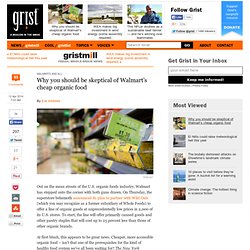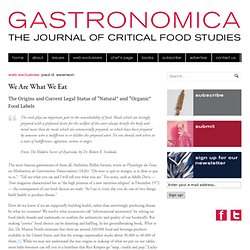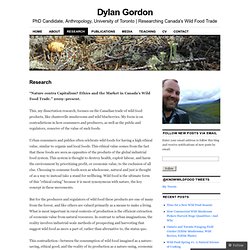

Aerial Photos Are New Weapon In Organic Civil War. The Cornucopia Institute commissioned this photo of an organic egg producer in Saranac, Mich.

According to Cornucopia, the facility is owned by Herbruck's Poultry Ranch, which has a license to maintain up to 1 million chickens on this site. Courtesy of The Cornucopia Institute hide caption itoggle caption Courtesy of The Cornucopia Institute The Cornucopia Institute commissioned this photo of an organic egg producer in Saranac, Mich. According to Cornucopia, the facility is owned by Herbruck's Poultry Ranch, which has a license to maintain up to 1 million chickens on this site.
Courtesy of The Cornucopia Institute If you look at it one way, these are the best of times for organic egg and milk producers. But that expansion is provoking suspicion, name-calling, and even clandestine investigations within the organic "community" because some organic advocates believe that some of these megafarms are not truly organic. Cornucopia published many of the photos online this week. Hartbeat newsletter. What Exactly Defines a “Craft” Spirit? Why you should be skeptical of Walmart’s cheap organic food. Out on the mean streets of the U.S. organic foods industry, Walmart has stepped onto the corner with both guns drawn.

On Thursday, the superstore behemoth announced its plan to partner with Wild Oats (which you may recognize as a former subsidiary of Whole Foods) to offer a line of organic goods at unprecedentedly low prices in 2,000 of its U.S. stores. To start, the line will offer primarily canned goods and other pantry staples that will cost up to 25 percent less than those of other organic brands. At first blush, this appears to be great news. Cheaper, more accessible organic food – isn’t that one of the prerequisites for the kind of healthy food system we’ve all been waiting for? The New York Times notes that Walmart’s big move could ultimately create a larger supply of organic goods, pushing down organic prices in the long run.
From The New York Times: “We’re removing the premium associated with organic groceries,” said Jack L. Hey — we didn’t say it was a good response. Organic Infographic. Un site utilisant Réseau Wordpress NT2. Kim Thùy, en entrevue à la sortie de son livre Man.

La planète entière tourne autour de la nourriture ! Les émissions de cuisine foisonnent, les livres de recettes se multiplient, les chefs s’expriment sur tous les plateaux, les médias sociaux deviennent un buffet à ciel ouvert, les Foodies sont légions et le Food une religion! Par conséquent la littérature, qui n’est pas étanche au discours social, s’en empare et les écrivains qui parlent de cuisine dans leur livre ont la cote. La preuve, ils semblent avoir une visibilité que d’autres n’ont pas… Ce petit quelque chose… Il n’y a pas même trois semaines, le roi du barbecue américain, Steven Raichlen*, a fait beaucoup parler de lui en sortant son dernier livre, Refuge à Chappaquiddick : un roman! Une autre sortie récente, québécoise cette fois, c’est le dernier roman de Kim Thùy, Mãn, paru aux éditions Libre-Expression et dont l’auteure a fait le lancement au restaurant Sesame du Vieux-Montréal.
Buon appetito! Entrevue de Kim Thùy: We Are What We Eat - Gastronomica. The Origins and Current Legal Status of “Natural” and “Organic” Food Labels The cook plays an important part in the nourishability of food.

Meals which are lovingly prepared with a profound desire for the welfare of the eater always benefit the body and mind more than do meals which are commercially prepared, or which have been prepared by someone who is indifferent to or dislikes the proposed eater. No one should cook when in a state of indifference, agitation, sorrow or anger.From The Hidden Secret of Ayurveda, by Dr. Robert E. Svoboda The most famous gastronome of them all, Anthelme Brillat-Savarin, wrote in Physiologie du Gout, ou Meditations de Gastronomie Transcendante (1826): “Dis-moi ce que tu manges, je te dirai ce que tu es.”: “Tell me what you eat and I will tell you what you are.”
Dylan Gordon. “Nature contra Capitalism?

Ethics and the Market in Canada’s Wild Food Trade.” 2009–present. This, my dissertation research, focuses on the Canadian trade of wild food products, like chanterelle mushrooms and wild blueberries. My focus is on contradictions in how consumers and producers, as well as the public and regulators, conceive of the value of such foods. Urban consumers and publics often celebrate wild foods for having a high ethical value, similar to organic and local foods. This ethical value comes from the fact that these foods are seen as opposites of the products of the global industrial food system. But for the producers and regulators of wild food these products are one of many from the forest, and like others are valued primarily as a means to make a living.
Dylan Gordon (KnowWildFood) sur Twitter. TEDxParis 2011 - Pierre Rabhi - Y a-t-il une vie avant la mort ? Parcourir ORBi. Goûter le monde.

Transitions - CV Viktoria von Hoffmann.